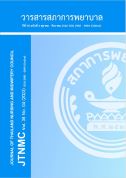The Experiences of Transition to Professional Nurses of Newly Graduated Nurses
DOI:
https://doi.org/10.60099/jtnmc.v38i04.264481Keywords:
newly graduated nurse, transition, experiences, tertiary hospital, qualitative researchAbstract
Introduction Newly graduated nurses are healthcare professionals with minimal experience in their professional roles. According to prior research, newly graduated nurses experienced stress with limited knowledge, and skills when working in specialized units where patient conditions are complicated. This may lead to burnout and a high turnover rate. Improving the support system for newly graduated nurses requires authentic insight from their direct experiences.
Objective To explore the experiences of newly graduated nurses during their transition to professional nurses
Design Descriptive qualitative study
Methods The informants were 27 newly graduated nurses working in a university hospital in the lower-northern region selected through purposive sampling. Three focus group interviews were conducted using a semi-structured interview guide via video conferences. Approximately 8 to 10 informants were invited, and they willingly participated in each focus group discussion at a date and time that best suited their convenience. The data were collected from January to February 2022. Sandelowski’s qualitative content analysis method was employed for data analysis. The study’s trustworthiness was established with dependability, confirmability, credibility, and transferability criteria.
Findings This study revealed that the newly graduated nurses were surprised by many competence requirements and expectations during the transition period. The experiences were categorized into four major categories as follows: 1) confronting with something new including a new workplace environment, learning new things, and emotions; 2) adjustment including accepting the role changes, adjusting to new co-workers, and adjusting to new tasks; 3) standing on their own feet including expectations from the workplace and end of the probation period; 4) seeking for additional knowledge by learning through nursing conferences, hands-on practice, self-study, and mentoring system.
Recommendation The findings indicated that newly graduated nurses working in super tertiary hospitals need specific preparation to adapt to their professional nursing roles and possess the required competencies as per their organization’s standards. This study also highlights the importance of close collaboration in preparing students for the transition from educational institutions to workplaces, ensuring their readiness before graduation, and alignment with the organizational requirements during the transitional phase.
Downloads
References
Meleis AI, Sawyer LM, Im EO, Hilfinger Messias DK, Schumacher K. Experiencing transitions: an emerging middle-range theory. ANS Adv Nurs Sci. 2000 Sep;23(1):12-28. doi: 10.1097/0001 2272-200009000-00006. PMID: 10970036.
Kramer M. Reality shock: Why nurses leave nursing. Am J Nurs 1975;75.
Benner P. From novice to expert: Excellence and power in clinical nursing practice. Menlo Park: Addison-Wesley; 1984.
Greenway K, Butt G, Walthall H. What is a theorypractice gap? An exploration of the concept. Nurse Educ Pract. 2019 Jan;34:1-6. doi: 10.1016/j. nepr.2018.10.005. Epub 2018 Oct 13. PMID: 30393025.
Shoghi M, Sajadi M, Oskuie F, Dehnad A, Borimnejad L. Strategies for bridging the theory-practice gap from the perspective of nursing experts. Heliyon. 2019 Sep 30;5(9):e02503. doi: 10.1016/j. heliyon.2019.e02503. PMID: 31687593; PMCID: PMC6819782.
Sirapo-ngam Y, Ratanaruengwatana S, Kanogsunthornrat N. Stress and coping during role transition of new graduated nurses. Rama Nurs J 1997;3:5-21. (in Thai)
Tamarpirat N, Oumtanee A. Being a newly graduated nurse working under supervision of a mentor. JRTAN [Internet]. 2017 Jun. 22 [cited 2023 Aug 17];18 (suppl.1):32-40. Available from: https://he01.tci-thaijo.org/index.php/JRTAN/article/view/90070 (in Thai)
Raetong P, Harniratisai T. Role change experience: From nursing students to registered nurses JTNMC [Internet]. 2013 Jan. 29 [cited 2023 Sep 25];27(2): 51-62. Available from: https://he02.tci-thaijo.org/index.php/TJONC/article/view/5369 (in Thai)
Gardiner I, Sheen J. Graduate nurse experiences of support: A review. Nurse Educ Today. 2016 May; 40:7-12. doi: 10.1016/j.nedt.2016.01.016. Epub 2016 Feb 1. PMID: 27125143.
Alharbi HF, Alzahrani J, Hamed A, Althagafi A, Alkarani AS. The Experiences of Newly Graduated Nurses during Their First Year of Practice. Healthcare (Basel). 2023 Jul 17;11(14):2048. doi:10. 3390/healthcare 11142048. PMID: 37510489; PMCID: PMC10378750.
Suzuki E, Tagaya A, Ota K, Nagasawa Y, Matsuura R, Sato C. Factors affecting turnover of Japanese novice nurses in university hospitals in early and later periods of employment. J Nurs Manag. 2010 Mar;18(2): 194-204. doi:10.1111/j.1365-2834.2010.01054. x. PMID: 20465747.
Bradshaw C, Atkinson S, Doody O. Employing a Qualitative Description Approach in Health Care Research. Glob Qual Nurs Res. 2017 Nov 24;4:23 33393617742282. doi: 10.1177/233339361774 2282. PMID: 29204457; PMCID: PMC5703087.
Turale S. A brief introduction to qualitative description: A research design worth using. PRIJNR [Internet]. 2020 Jul. 9 [cited 2023 Sep 25];24(3):289-91. Available from: https://he02.tci-thaijo.org/index.php/PRIJNR/article/view/243180
Lambert VA, Lambert CE. Qualitative descriptive research: An acceptable design. PRIJNR [Internet]. 2013 Jan. 31 [cited 2023 Oct 2];16(4):255-6. Available from: https://he02.tci-thaijo.org/index.php/PRIJNR/article/view/5805
Sandelowski M. Whatever happened to qualitative description? Res Nurs Health. 2000 Aug;23(4): 334-40. doi: 10.1002/1 098-240x(200008)23: 4<334::aid-nur9>3.0.co;2-g. PMID: 10940958
Lincoln YS, Guba EG. Naturalistic inquiry: Sage; 1985.
Stahl NA, King JR. Expanding approaches for research: Understanding and using trustworthiness in qualitative research. J Dev Educ [internet]. 2020 [cited 2023 Oct 2];44 (1):26-8. Available from: https://files.eric.ed.gov/fulltext/EJ1320570.pdf
Kuewong G, Oumtanee A. Self-Development of newly graduated nurses working in an Intensive Care Unit at a University Hospital. TRC Nurs J 2020 [cited 2023 Sep 25];13:90-101. Available from: https://he02.tci-thaijo.org/index.php/trcnj/article/view/243817 (in Thai)
Narueponjirakul C, Oumtanee A. Experiences of a team mentor mentoring newly graduated nurses working in emergency room. JOPN 2019 [cited 2023 Sep 25];11:12-23. Available from: https://he01.tci-thaijo.org/index.php/policenurse/article/view/165789/132033 (in Thai)
Downloads
Published
How to Cite
Issue
Section
License
Copyright (c) 2023 The Journal of Thailand Nursing and Midwifery Council

This work is licensed under a Creative Commons Attribution-NonCommercial-NoDerivatives 4.0 International License.








